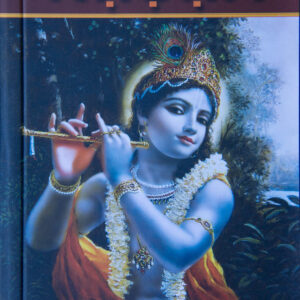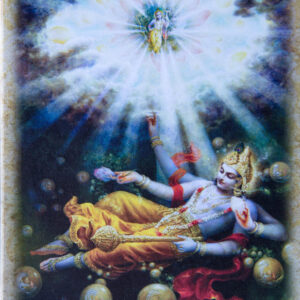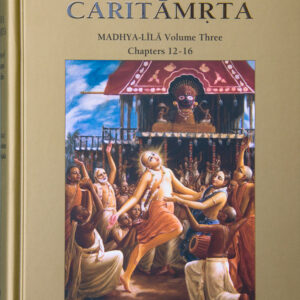Description
CHAPTER ONE
Rāja-vidyā: The King of Knowledge
śrī bhagavān uvāca
idaṁ tu te guhya-tamaṁ
pravakṣyāmy anasūyave
jñānaṁ vijñāna-sahitaṁ
yaj jñātvā mokṣyase ’śubhāt
“The Supreme Lord said: My dear Arjuna, because you are never envious of Me, I shall impart to you this most secret wisdom, knowing which you shall be relieved of the miseries of material existence.” (Bhagavad-gītā 9.1)
The opening words of the ninth chapter of the Bhagavad-gītā indicate that the Supreme Godhead is speaking. Here Śrī Kṛṣṇa is referred to as Bhagavān. Bhaga means “opulences,” and vān means “one who possesses.” We have some conception of God, but in the Vedic literature there are definite descriptions and definitions of what is meant by God, and what is meant is described in one word – Bhagavān. Bhagavān possesses all opulences – the totality of knowledge, wealth, power, beauty, fame, and renunciation. When we find someone who possesses these opulences in full, we are to know that he is God. There are many rich, wise, famous, beautiful, and powerful men, but no one man can claim to possess all of these opulences. Only Kṛṣṇa claims to possess them in totality.
bhoktāraṁ yajña-tapasāṁ
sarva-loka-maheśvaram
suhṛdaṁ sarva-bhūtānāṁ
jñātvā māṁ śāntim ṛcchati
“A person in full consciousness of Me, knowing Me to be the ultimate beneficiary of all sacrifices and austerities, the Supreme Lord of all planets and demigods, and the benefactor and well-wisher of all living entities, attains peace from the pangs of material miseries.” (Bhagavad-gītā 5.29)
Here Kṛṣṇa proclaims that He is the enjoyer of all activities and the proprietor of all planets (sarva-loka-maheś-varam). An individual may possess a large tract of land, and he may be proud of his ownership, but Kṛṣṇa claims to possess all planetary systems. Kṛṣṇa also claims to be the friend of all living entities (suhṛdaṁ sarva-bhūtānām). When a person understands that God is the proprietor of everything, the friend of everyone, and the enjoyer of all, he becomes very peaceful. This is the actual peace formula. No one can have peace as long as he thinks “I am the proprietor.” Who is capable of claiming proprietorship? Only a few hundred years ago the Native Indians were considered the proprietors of America. Today, we in our turn are claiming that proprietorship. But in four hundred or a thousand years, perhaps someone else will come to claim the same. The land is here, and we come here and falsely claim ourselves to be proprietors of it. This philosophy of false proprietorship is not in line with Vedic injunctions. Śrī Īśopaniṣad states that “everything animate or inanimate that is within the universe is controlled and owned by the Lord” (īśāvāsyam idaṁ sarvam). The truth of this statement is factual, but under illusion we are thinking that we are the proprietors. In actuality God owns everything, and therefore He is called the richest.
Of course, there are many men who claim to be God. In India, for instance, at any time, one has no difficulty in finding at least one dozen people claiming to be God. But if you ask them if they are the proprietor of everything, they find this difficult to answer. This is a criterion by which we can understand who God is. God is the proprietor of everything, and, being so, He must be more powerful than anyone or anything else. When Kṛṣṇa was personally present on this earth, no one could conquer Him. There is no record of His ever having lost a battle. He belonged to a kṣatriya (warrior) family, and the kṣatriyas are meant to give protection to the weak. As far as His opulence is concerned, He married 16,108 wives. Every wife had her own separate palace, and Kṛṣṇa expanded Himself 16,108 times in order to enjoy them all. This may seem difficult to believe, but it is stated in Śrīmad-Bhāgavatam, and the great sages of India recognize this as scripture and recognize Kṛṣṇa as God.
In the first verse of this ninth chapter, by the word guhya-tamam, Śrī Kṛṣṇa intimates that He is imparting the most confidential knowledge to Arjuna. Why is He proclaiming this to Arjuna? It is because Arjuna is anasūyu – nonenvious. In the material world if someone is greater than us, we are envious. We are not only envious of one another but of God. Also, when Kṛṣṇa says, “I am the proprietor,” we disbelieve it. But this is not the case with Arjuna, who listens to Kṛṣṇa without envy. Arjuna does not cavil with Kṛṣṇa but agrees with whatever He says. This is his special qualification, and this is the way of understanding the Bhagavad-gītā. It is not possible to understand what God is by our own mental speculation; we have to hear, and we have to accept.








Reviews
There are no reviews yet.